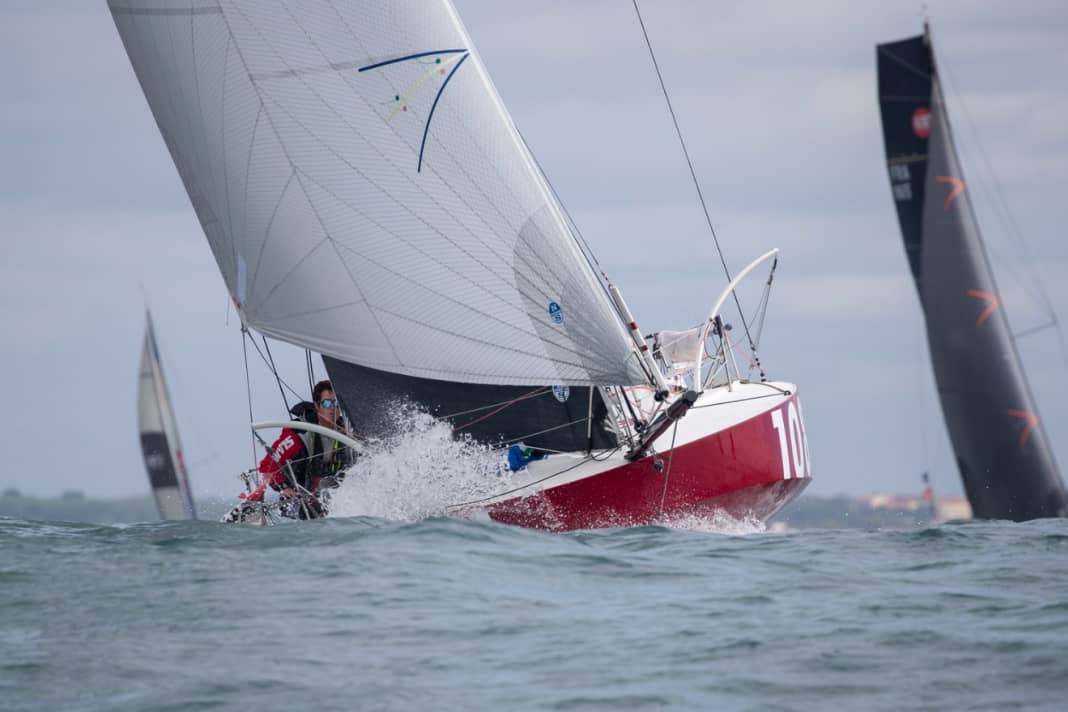





You can do everything right for a week, like Felix Oberle (SUI 1028) or Federico Waksman (URU 1019), and then find yourself at the back of the pack. Or you can be brave, invest in a position in the west, like Michael Gendebien (BEL 921) or Mael Cochet (FRA 621), and suddenly find yourself fighting for a place on the podium.
Even at the weekend, predicting the top three in both classes would have been like winning the lottery. And so some of the favourites faltered pretty badly, while others were able to prevail despite all the adversities of the moody weather - above all the two frontrunners in the Protos: Victor Mathieu in his somewhat older David Raison Mini "Celeris Informatique" (FRA 967) and Carlos Manera in Sam Manuard's 2022 "Xucla" trailer (ESP 1081).
The results of the first stage of the Mini-Transat in the prototype class
The two battled it out all morning for victory on leg 1: Manera coming more from the north-east, with the fresher wind for a long time and significantly more speed, Mathieu more from the north. Yesterday morning, the Frenchman, who has dedicated his life entirely to ocean racing, still had a lead of more than 40 nautical miles over Manera - with only around 200 nautical miles remaining to La Palma. A cushion so large that weather router Christian Dumard no longer doubted Mathieu's victory.
But once again, things turned out differently. Manera, whose boat has C-foils and centreboards and is therefore considered to be very fast on all courses, was able to completely make up the difference within 24 hours. This morning he was ahead several times, with such small gaps that the resolution of the tracker was barely sufficient to adequately reflect the situation on the water. It was literally a matter of a few hundred metres.
Photo finish in slow motion
Carlos Manera finally took first place ahead of Victor Mathieu in the photo finish, which was played out as if in slow motion. It took him 9 days, 19 hours, 40 minutes and 38 seconds to cover the 1,351 nautical miles from Les Sables to La Palma in a direct route. He actually sailed 1,580 miles through the water, which means an average speed of 6.7 knots.
In the end, the gap to Mathieu was just ten minutes. The Frenchman sailed significantly faster with an average of 7.0 knots, but covered more distance with 1,642 nautical miles.
It also remained exciting - and close - behind them. Julien Letissier ("Frérots Branchet", FRA 1069), who had remained in contact with the leading group throughout the entire leg, secured third place with an impressive final sprint in the Passat. He pushed particularly hard in the high-speed phase, in which he consistently logged distances of around 300 nautical miles.
Caroline Boule cannot fulfil expectations with her foiler
With Laure Galley ("DMG Mori", FRA 1048) and Marie Gendron ("Léa Nature", FRA 1050), two women who had been among the favourites from the start finished in the top five. Both lost comparatively little time on Manera, meaning that they are still in contention for overall victory. Their boats are carbon versions of David Raison's Maxi 6.50.
Federico Waksman, who had dominated more than half of the first stage, was no longer able to keep up when the trade winds set in. Shortly beforehand, he had reported technical problems that had noticeably handicapped him. His positioning to the east of the great circle course also proved to be unfortunate in retrospect. His delay will hurt him, but he too will still be in contention for victory when stage 2 kicks off on 28 October.
That will hardly be the case for Caroline Boule. At 10am today, she was still 150 nautical miles behind in 19th place - not what she had hoped for her Sam Manuard foiler "Nicomatic" (FRA 1067), which theoretically has the highest speed potential of all the Minis at the start.
These are the top finishers in the series classification on stage 1 of the Mini-Transat
In the series boats, everything looks set for a victory for the Belgian Michael Gendebien, who at 10 o'clock this morning still had eight nautical miles to the finish and a lead of just under five miles over Justin Baradat.
It's amazing that the top six are all sailing on Pogo 3, with the best Maxi 6.50 in P7. It's like a reversal of the trend from the past two years, which clearly favoured the scow designs shaped by David Raison. The reason for the dominance: the high proportion of light and upwind, which favours the otherwise somewhat outdated design by Guillaume Verdier. Let's see how that looks on the second stage.
For Felix Oberle from Switzerland, the outcome of the opening race remains somewhat open. He was in P14 this morning with 120 nautical miles to go to the finish. That will put a serious strain on his time account. He had invested in an easterly course, which looked highly promising until the weekend - but then everything went west.
Difficult starting position for Lisa Berger
Nevertheless, he can still improve his position considerably, as the north-easterly trade wind weakens towards the evening and leaves behind quite a patchwork of pressure conditions. Experience has shown that a skipper who has grown up on inland waterways copes well with this.
This could also play into the hands of Lisa Berger ("Dimension Polyant", AUT 980). She already had a problem in the early stages of the race, which set her back and prevented her from realising her speed potential until the end. With 230 nautical miles to go to the finish, she will probably not arrive until Friday evening. A heavy burden for the overall standings, for which she had aimed for a top ten result. But she can fight.

